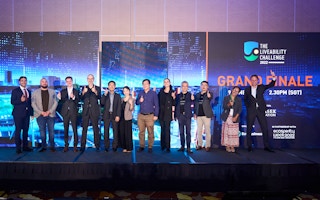Eight finalists have been selected from more than 600 entries for the 2023 edition of The Liveability Challenge (TLC), with blue economy solutions featuring on the shortlist for the first time.
The initiative focused on sustainability innovation launched in 2019 to find solutions to Asia’s biggest sustainability challenges, with funding up for grabs for startups working in chosen sustainabilty themes each year.
This year marks the sixth edition of the competition presented by Temasek Foundation and organised by Eco-Business. Available funding for the winners has increased to S$2.5 million (US$1.87 million) this year.
To continue reading, just sign up – it’s free!
- Get the latest news, jobs, events and more with our Weekly Newsletter delivered to you free.
- Access the largest repository of news and views on sustainability topics.
- You can publish your jobs, events, press releases and research reports here too!
Newsletter subscribers do not necessarily have a website account. Please sign up for free to continue reading!
The themes for TLC 2023 are climate change and food and nutrition, with the climate track split between decarbonisation and ocean conservation and restoration.
The 2023 shortlist features solutions from the Philippines and Israel for the first time in TLC’s six-year history. The other finalists are from Singapore, United Kingdom and United States.
This year’s finalists are:
Climate change (decarbonisation and ocean conservation and restoration)
1. Team: Seabound (United Kingdom)
Solution: Carbon capture for ships. Equipment installed by a ship’s funnel that traps 95 per cent of a vessel’s carbon emissions.
2. Team: Carbix Corporation (United States)
Solution: Technology captures point source emissions from industry and converts the carbon into construction materials.
3. Team: Susteon (United States)
Solution: Capturing carbon dioxide and converting it into “green methane” or renewable natural gas.
4. Team: Seaforestation.Co (The Philippines)
Solution: Marine permaculture, aims to scale seaweed forest regeneration to remove atmospheric carbon and provide deepwater irrigation.
5. Team: Nika.eco
Solution: An analysis tool for mangrove restoration and conservation and blue carbon projects.
Food and nutrition
6. Team: Proteomax (Singapore)
Solution: Enabling the manufacture of alternative proteins with the same nutritional content as animal-based products.
7. Team: TeOra (Singapore)
Solution: Orally delivered solution to prevent and treat scale drop disease virus in Barramundi or Asian sea bass.
8. Team: Plantae Bioscience (Israel)
Solution: Cultivating classical and gene-edited tomatoes for vertical farms in Singapore,
Counting down to 8 June
Besides the top million-dollar prizes, winners stand to win investment prizes of S$100,000 (US$75,000) each from strategic partners including Rumah Group, PeakBridge, Planet Rise, Quest Ventures and Trirec.
Eco-Business founder and managing director Jessica Cheam said an ocean track was added this year as the blue economy has been a long-neglected element of climate action – particularly in archipelagic Southeast Asia, which is heavily dependent on the ocean for the health and livelihoods of 625 million people.
“The United Nations High Seas Treaty and the UN’s subsequent treaty to tackle plastic pollution are long-awaited measures to protect a natural resource that provides humanity with at least half of the oxygen we breathe, the ingredients to the medicines we need to fight diseases such as Alzheimer’s disease and that adds US$1.5 trillion a year to the global economy,” said Cheam.
“We are banking on the solutions the TLC judges select to not only recognise the need to improve food and nutrition systems and decarbonise the one of the world’s most climate-vulnerable regions, but go some way to protecting an essential natural resource that has been taken for granted for too long – our ocean,” she said.
The grand finale will take place on 8 June at Marina Bay Sands in Singapore.
Last year’s Liveability Challenge winner was a social forestry project in Indonesia. Past winners have included US-based Seachange, now known as Equatic, who is currently building a pilot plant in Singapore to convert carbon in seawater into green hydrogen, and TurtleTreeLabs, a Singapore-based firm developing lab-grown milk.

















